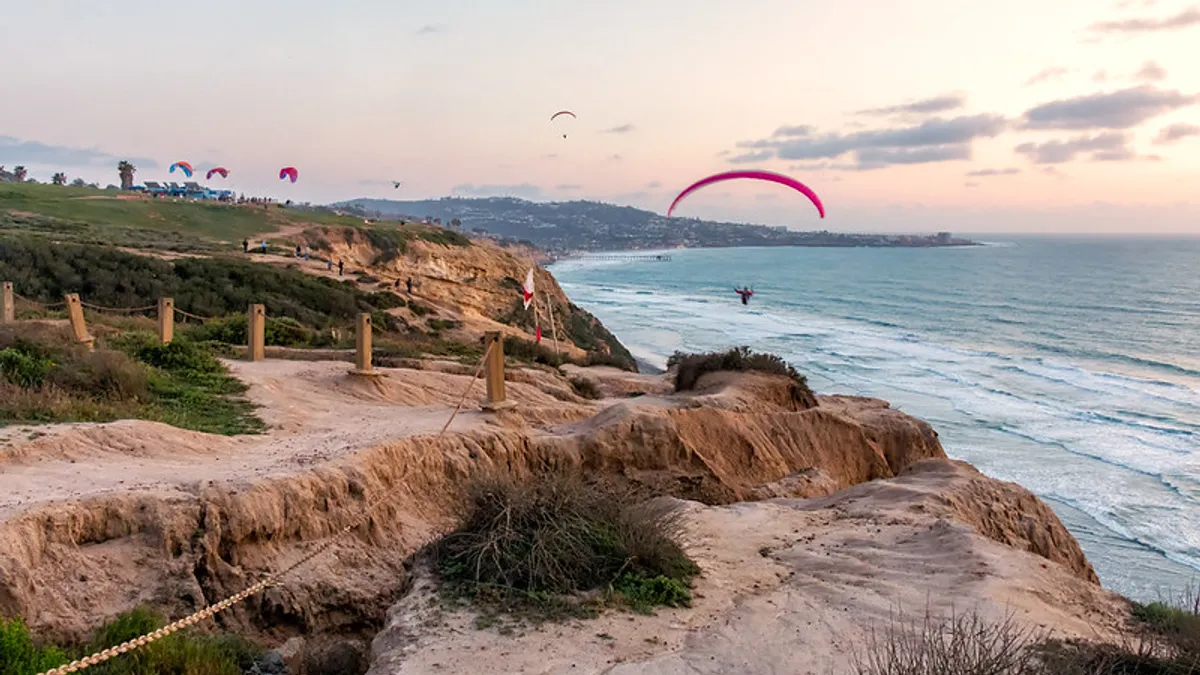Dive Brief:
- The Resilient Cities Catalyst (RCC), a nonprofit formed by members of the former 100 Resilient Cities (100RC) initiative, has launched the California Resilience Partnership (CRP), a multi-million dollar public-philanthropic collaboration.
- The partnership will bring together a diverse group of stakeholders, state agencies and organizations to support statewide priorities as California faces urgent and compounding resilience challenges linked to climate change, the pandemic, racial injustice and economic issues.
- The CRP model is designed to attract funding for resilience projects, with a goal to secure at least $30 million from public, private and philanthropic sources within five years to help scale those projects throughout the state.
Dive Insight:
The past year has presented a flurry of devastating challenges for California, with some even questioning if the "California dream" had come to end.
Wildfires and the pandemic delivered a one-two punch to the state, with a record-setting 4 million acres burned in 2020 and more than 500,000 Americans dead from COVID-19 to date. Meanwhile, local leaders have been called on to address devastating racial inequities within cities, an issue that has been exacerbated by recent instances of police brutality and racial disparities in COVID-19 cases and deaths.
In short, it’s been a challenging year for the state and its residents. The CRP aims to improve responses to these mounting issues with stronger coordination and collaboration across sectors and regions.
"There is growing philanthropic interest in climate and resilience, but the real hurdle is to recognize that no one sector is going to solve these challenges alone," Sam Carter, founding principal at Resilient Cities Catalyst, said in an email interview.
"In California, a state that is so large and so diverse, we saw an opportunity to bring together partners across sectors (county governments, city governments, academic partners, key nonprofits, and community groups) to collectively design new, potentially replicable solutions to local problems," he said.
The CRP will be built off pilot work initially completed in the Greater Los Angeles and San Diego regions. Those efforts included identifying and developing new approaches to urgent climate change challenges, primarily wildfire and coastal erosion, according to Carter.
"The approach through these pilots has been different than 'business as usual' in several respects: We advance a collaborative approach among multi-sector partners and are focused on a regional-scale, which requires a different governance approach than just partnering with a city, county, or state alone," he said. "Importantly, our focus is not on addressing climate challenges alone, but on resilience-building in general, addressing climate challenges in the context of other urgent risks (for example, housing affordability) and building preparedness for inevitable future shocks."
Cities have seen more coordinated efforts emerge on resilience issues in recent years, particularly in 2013 following Hurricane Sandy's impact to the Northeast. The Rockefeller Foundation created the 100RC program to help oversee some of that work, and also helped establish the position of city resilience officers. The 100RC ended in 2019, but the Resilient Cities Catalyst and the Global Resilient Cities Network have since spun out of the group.
In many ways though, 2020 was the year resilience "came to the forefront," according to Carter.
"We spent the better part of the last decade through RCC and previously at 100RC talking about the need to address existential challenges that were inextricably linked together," he said.
"In 2020, we saw that firsthand, especially here in the U.S. — a long-overdue reckoning with racial injustice, a once-in-a-century pandemic that has now claimed 500,000 lives, and one of, if not the, costliest natural disaster years ever. What it means to us at RCC is that the resilience approach has never been more necessary," Carter said.
CRP has received a series of grant funding to date, including $1.85 million from the Hilton Foundation; $600,000 from the California Ocean Protection Council; $180,000 in grants from the Alumbra Innovations Foundation and The San Diego Foundation for the San Diego Region Coastal Exchange; and $100,000 from the Builder’s Initiative to support the San Diego Future Fund.












